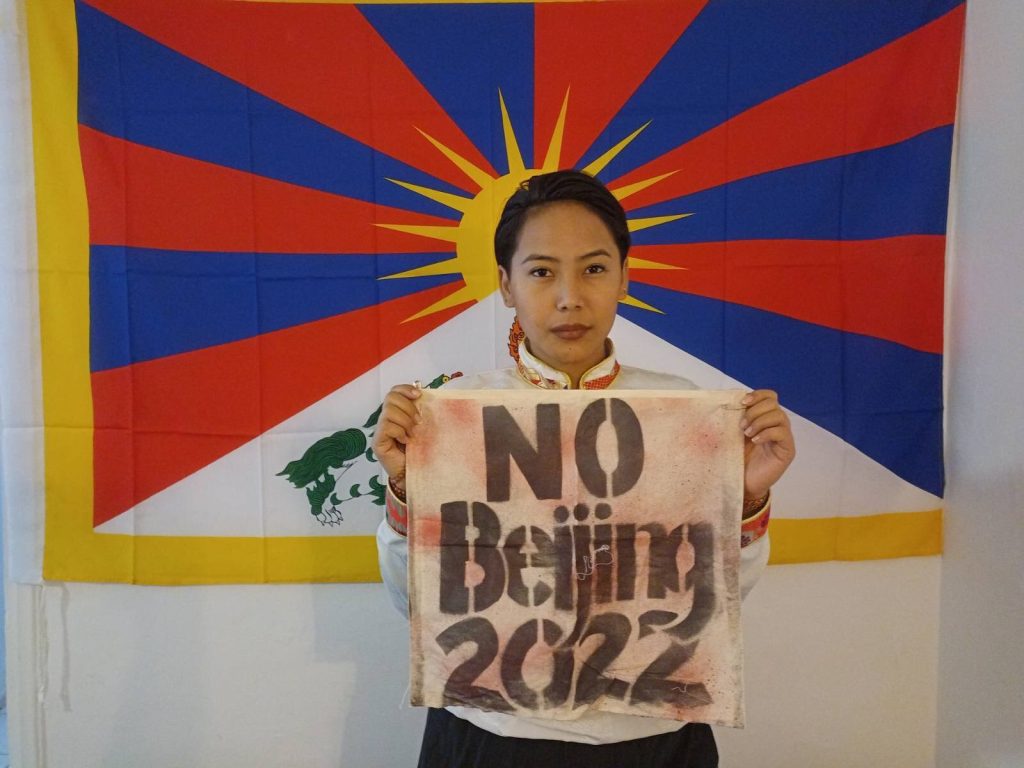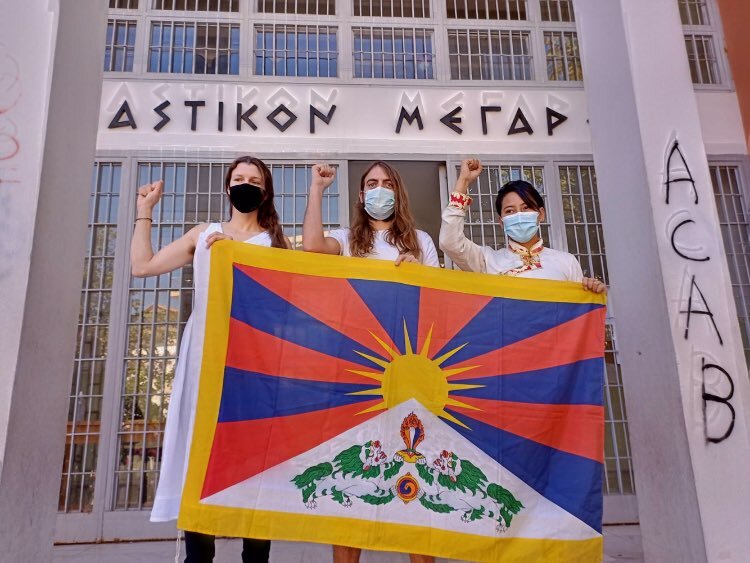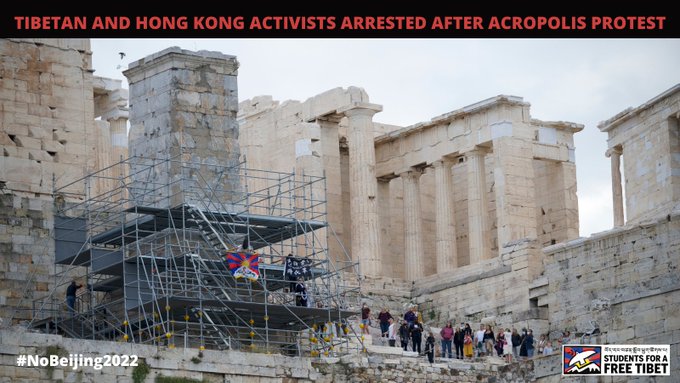CCP undermining the right to protest in the birthplace of European democracy
A few months ahead of the Beijing Winter Olympics, in October 2021, activists gathered at multiple locations in Athens to protest China’s hosting of the Games. In an alarming turn of events, Greek police arrested several of the activists. Some were arrested for unfurling banners, others for simply handing out fliers or, even just attending the “No Beijing 2022” events. Some were released without charge, others were acquitted after trial. For three activists, their trials were postponed until later in 2023.

Photo: Free Tibet
Before travelling to Greece, the activists – who were mostly Hong Kongers and Tibetans from Switzerland, the USA and Canada – tried to engage with International Olympics Committee (IOC) officials. They explained that hosting the Olympics in an authoritarian country that commits genocide was a violation of the Olympic Charter, which ensures that the games promote “a peaceful society concerned with the preservation of human dignity”. However, their arguments fell on deaf ears. Frances Hui, the director of “We The HongKongers”, told Index that IOC officials dismissed them, saying “you’re young, this is a complicated issue.”
Another activist, Zumretay Arkin, director of the World Uyghur Congress Women’s Committee, told Index that protesting at the Olympic flame lighting ceremony “was an opportunity for us to counter Beijing in Greece.”
While the activists knew there are always risks involved in protesting, they were not particularly worried. The most common tactic used to silence dissidents abroad – threatening the safety of loved ones – could not work as most activists involved had no direct family left in their homelands. Tsela Zoksang, a Students for Free Tibet member, told Index: “I have the privilege to raise my voice up against the CCP, unlike many communities who remain under the brutal rule of the CCP, and so I think I have a duty to amplify their voices and their stories.” Greece’s position as a member of the EU also reassured the protesters. According to Pema Doma, one of the activists and Executive Director at Students for a Free Tibet, they believed it “very unlikely that a country of the EU would act on orders of the Chinese government”. These beliefs were unfortunately misplaced.

Fern MacDougal, Jason Leith and Chemi Lhamo outside the Greek jail after their action. Photo: Free Tibet
CCP involvement
On 18 October, activists congregated outside the flame lighting ceremony. The activists planned to stand outside the security cordon and hand out flyers to journalists as they entered the Temple of Hera.
The activists were first approached by a Greek police officer curious about their activity but were left undisturbed. This soon changed. According to four activists that Index spoke to, the Greek officer spoke to an individual who identified themself as and was dressed in the uniform of, a member from the Chinese Embassy. The Greek officer insisted that “They’re just sitting there, I don’t see why they shouldn’t be allowed to sit there”. According to the activists’ retelling, this was met with the firm instruction to “make them leave. Tell them they can’t stay here”. They were moved from the entrance car park to a public pavement.
The activists had spotted other plain-clothed Asian men earlier taking photos of them. These same men approached the Greek police, and after a short discussion the activists were detained by Greek police officers. They were arrested without being informed of their rights and taken in unmarked cars to Pyrgos Police Station.
The Greek police possess broad powers to arrest activists for unsanctioned actions. Avgoustinos Zenakos, an investigative journalist from the Manifold Files, told Index: “The Greek police interpret these laws in their favour…This means whether it is abused or used in an honest way depends on the culture of the police rather than the letter of the individual law.” During an official visit to Greece, the UN Working Group on Arbitrary Detention reported that they received “credible information involving non-nationals in pre-trial detention who were detained exclusively on the basis of police testimony, including when there was other evidence that did not support the guilt of the persons involved.”
The protesters believe that the decision to arrest them was not made by the police alone. Doma told Index: “We knew right from the beginning it was the Chinese Embassy staff directing the Greek police quite directly, quite closely, you know, telling them exactly what to tell us”.
The next day, another group of activists were detained after holding a press conference to discuss the CCP’s human rights abuses to members of the media. The event was monitored by unknown individuals, some of whom attempted to stare down and harass the activists. When some of the activists confronted the individuals and asked them where they were from they laughed before replying, “We’re from China”. Tsering Gonpa, a Tibetan Youth Association of Europe activist, and Tenzin Yangzom, Grassroots Director at Students for a Free Tibet, climbed into a taxi together after the event and immediately heard sirens. Their passports were confiscated and they were escorted to the Athens police station.
“We were extremely shocked by the CCP’s influence and leverage in democratic Greece. We knew the situation was bad, but we certainly didn’t expect this level of transnational repression,” Yangzom told Index.
According to Zenakos, to find criticism of Greece’s relationship with China, including Chinese state ownership of key Greek assets and Greece’s involvement in key initiatives such as the 16+1 grouping of countries and China’s “One Belt, One Road” strategy, “you would have to dig deep.” These all raise questions as to whether increasing economic entanglement is leading Greece to become overprotective of its relationship with China. For instance, in 2016 Athens pushed for an EU statement on the South China Sea to be amended to remove criticism of Beijing and a year later it vetoed an EU statement at the UN Human Rights Council condemning human rights abuses in China. According to media reporting, this was the first time the EU didn’t make a statement of this nature at the council.
Mistreatment in the police stations
On 17 October 2021, Tesla Zoksang and Joey Siu, and one other anonymous activist, planned to install a banner onto the outer-walls of the Acropolis. Within about two minutes of ascending, a security guard approached and cut down the banner. The activists remained perched on the scaffolding watching police cars arrive before they were escorted down. Greek barrister Alexis Anagnostakis, who represented the activists, told Index that “the activists’ removal from the protest site, their arrest, and their remand in police custody was a disproportionate interference with their rights for freedom of expression and assembly, as is their criminal prosecution.” Anagnostakis was also surprised by the escalation “since similar protests on the Acropolis reportedly have never before been prosecuted.”

According to Tsela Zoksang, at the police station during an interrogation, one activist who wished to remain anonymous, was told by Greek officials that a representative from the US embassy was there to see them. However, the representative later allegedly admitted to being from an unspecified Greek agency. With assistance from the non-profit Vouliwatch, Index submitted an FOI request to the Greek police, attempting to verify these claims but were denied the disclosure on the basis that Index does not have “specific legitimate interest”. Index has lodged an appeal.
Other detained activists were not informed of their rights or what crime they were alleged to have committed. When the activists detained outside of the press conference asked why they were being detained an officer told them “to be completely honest with you, I don’t know why we’re taking you with us but I got orders from the higher ups”.
They were asked to sign documents without an English translation. After refusing, Zoksang reported that the officers “began getting very angry and frustrated. They were saying, ‘You are disobeying me, you are disobeying the law.’ I said, ‘No, but I can’t sign something if I don’t know what it says’”. They were told they would be punished for not signing documents and giving their fingerprints but at the time of going to press, nothing has yet come of this. The activists were also asked a series of seemingly irrelevant questions such as their parents’ names. Given the potential involvement or presence of CCP-affiliated actors in their detention, they feared this information would be shared with the Chinese authorities, potentially imperilling their ability to travel and the safety of any family members in CCP-jurisdiction.
Every Tibetan is an activist
Chemi Lhamo, a Tibetan activist, explained to Index: “Every Tibetan that was born after 1959 is born an activist … because your existence is by default political in nature when you are born stateless.”
While the Games still went ahead, the campaign nonetheless left its mark. As Lhamo told Index, “There was a moment of time, in the world, in the busy world that we are in, when people stopped for a moment to ask, ‘what’s happening? What’s happening within Tibet?’”
The diplomatic boycotts were also found to have had a major impact on viewership. Yangzom told Index that the oppression of the activists was “vindication that the work that we’re doing is making an impact and we must be doing something right – so we mustn’t give up and keep raising our voices on behalf of Tibetans inside Tibet and all those oppressed.”
All charges against the Acropolis actors were dropped on 17 November 2022. Michael Polak, their British ‘Justice Abroad’ barrister, stated “It is hoped that the acquittals today will send a strong message that legitimate peaceful protest and assembly, of the type banned totally in China and Hong Kong, will be allowed even when it hurts the fragile sensibilities of the Beijing and Hong Kong regimes.”
Yet, the charges against others for attempting to “pollute, damage and distort” the historical monument of Olympia, punishable by up to five years in prison, still stand. The original trial against Lhamo, Jason Leith and Fern MacDougal was delayed before being again pushed back to November 2023. MacDougal told Index she worries “the delay in trial has the effect of both avoiding public discussion of the human rights violations that we took action based on and of obscuring the meaning of our action.”
Lhamo also noted that “it is another year of waiting, and having a pending court case has its own consequences which seem to unfold in various ways for us.” She elaborated to Index that she is “lucky” to have continued support from the lawyers and organisations, but the charge is a significant barrier for them to engage in more direct actions and affects their ability to travel. Yet she emphasised: “Don’t feel anxious for us [about the court case] … Let’s channel that energy of solidarity and support to the folks we are actually working for, those inside Tibet.”



